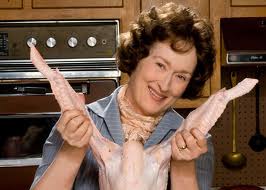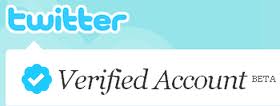 |
| Amy Adams as Julie in “Julie & Julia” |
Last night I was tooling on my Twitterstream when I noticed a curious tweet from The NY Times‘s food columnist and author Amanda Hesser.
In an attempt to learn the true identity of influential (18K+ followers) Twitter personality @RuthBourdain (a name amalgamated from fellow foodies Ruth Reichl and Anthony Bourdain), Ms. Hesser asked her followers if anyone has made a list of their shared followers.
I summoned my Twiangulate app and ran a cross-check of @RuthReichl (58K+ followers) and @AnthonyBourdain (18K+ followers). It produced 45 common followers between them. (Ms. Hesser slyly suggested that WashPost food editor Joe Yonan might be a candidate for @ruthbourdain.)
 |
| Meryl Streep as Julia Child |
What I didn’t know was that @anthonybourdain, like @RuthBourdain, was an unverifiable “nom de twume.” The real Anthony Bourdain, author and celebrated chef at New York’s Brasserie Les Halles restaurant, tweets under the handle @NoReservations (180K+ followers), the name of his Travel Channel show. (My bad.)
A new cross-check of Ms. Reichl’s and Mr. Bourdain’s actual Twitter handles (his “verified,” hers not) yielded 278 common followers.
Anyway, this got me thinking about Twitter, and the dangers of anonymity, a subject on which I’ve written previously. Very quietly, Twitter stopped its program to anoint certain Twitter “stars” (“the chosen”) with “Verified” accounts. This was a way, Twitter claimed, to “limit user confusion by making it easier to identify authentic accounts on Twitter.” A site called Truth Tweet appears to have captured and catalogued verified users.
I’m not happy about this. We all know what can happen when poseurs commandeer legitimate Twitter accounts. Think BP, Steve Jobs, Goldman Sachs, for starters. Fun to read, but most Americans don’t differentiate. Let’s hope Twitter re-introduces a more inclusive verification program so that every active Twitter user can stake claim to his or her own identity.
Separately, but not unrelated, I recently registered my displeasure over the practice of when one distorts your original tweet to suit another’s ends. I asked whether this is “more than bad Twitter manners?” Huh? Isn’t getting re-tweeted a validation of one’s influence? Yes and no.
My tweet in question read:
@peterhimler @rapleaf profiles users by name (think facebook, myspace, political ops)
WSJ.com (via @emilysteel)
Very shortly thereafter, the media-mining minds at Rapleaf re-tweeted my original tweet, as follows:
@Rapleaf @PeterHimler Check out this interesting WSJ post on Rapleaf’s CEO and our company’s commitment to privacy: WSJ
In reality, my original tweet was intended to raise eyebrows over the big brotherish approach to mining one’s personal online data. (Doesn’t Rapleaf have close to a billion people in its database?) From The Journal:
“RapLeaf says it never discloses people’s names to clients for online advertising. But possessing real names means RapLeaf can build extraordinarily intimate databases on people by tapping voter-registration files, shopping histories, social-networking activities and real estate records, among other things.
Pushing the limits of online privacy is one thing, but my personal beef is aimed at Rapleaf social media person who twisted my original sentiment to promote the company. If the company took this license with a re-tweet, just think what it might do with your personal data.
Happy Thanksgiving all. Did you know that the average calories consumed on Thanksgiving range from 3000-7500? Yikes!

